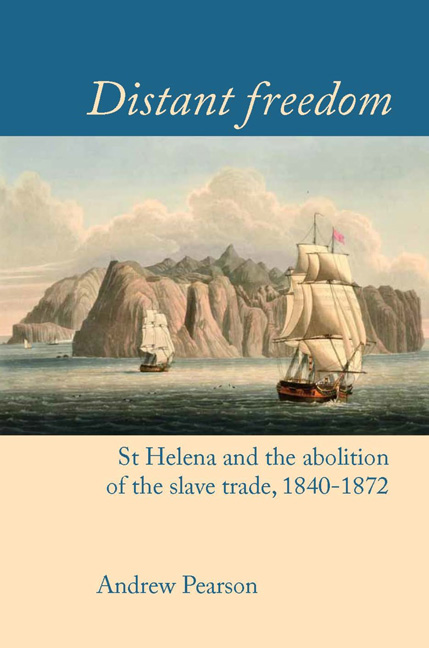Book contents
- Frontmatter
- Dedication
- Contents
- Figures
- Tables
- Acknowledgements
- Introduction
- Map
- 1 A Place of Immense Advantage
- 2 London and Jamestown
- 3 Sailortown
- 4 Life and Death in the Depots
- 5 ‘All, all, without avail’
- 6 After ‘Liberation’
- 7 Island Lives
- Conclusion
- Appendix 1 Liberated Africans Captured aboard Slave Ships: Cases Tried at Freetown, Luanda, Cape Town and St Helena, 1836–68
- Appendix 2 Prizes Adjudicated by the Vice-Admiralty Court of St Helena
- Appendix 3 Liberated African Emigration from St Helena
- Appendix 4 Emigrant Voyages from St Helena
- Bibliography
- Index
2 - London and Jamestown
- Frontmatter
- Dedication
- Contents
- Figures
- Tables
- Acknowledgements
- Introduction
- Map
- 1 A Place of Immense Advantage
- 2 London and Jamestown
- 3 Sailortown
- 4 Life and Death in the Depots
- 5 ‘All, all, without avail’
- 6 After ‘Liberation’
- 7 Island Lives
- Conclusion
- Appendix 1 Liberated Africans Captured aboard Slave Ships: Cases Tried at Freetown, Luanda, Cape Town and St Helena, 1836–68
- Appendix 2 Prizes Adjudicated by the Vice-Admiralty Court of St Helena
- Appendix 3 Liberated African Emigration from St Helena
- Appendix 4 Emigrant Voyages from St Helena
- Bibliography
- Index
Summary
Much of this book is written from a perspective that is, quite literally, insular. This is not unreasonable, given that it narrates events that centred on St Helena, over 1,000 miles from the nearest continental landfall and a far greater distance from Europe. From the colony's earliest years its documentary record reflects a sense, and actuality, of isolation – one which prevailed into the nineteenth century and arguably persists to the present day. Nevertheless, broader perspectives cannot be ignored. Slave prizes and their human cargo did not arrive at St Helena in 1840 because of events in the South Atlantic but because of policy made in Britain. Similarly, the long-term operation of the island's Liberated African Establishment would largely – though not entirely – be dictated by London.
Anti-slavery was a mainstream issue of the period, entwined in many aspects of British domestic and foreign affairs. It was, moreover, a cause that was widely embraced both within and outside Parliament. Informed opinion had the potential to influence the course of events on St Helena, and this chapter therefore begins by considering the extent to which events on the island were known in metropolitan Britain. Its findings are in fact quite negative: information was scant, leaving parliamentarians, anti-slavery lobbyists and the general public alike badly informed. It was also the case that events on this remote island were eclipsed by matters that were genuinely of greater importance, or which were simply more interesting.
As a consequence, the governance of St Helena was a departmental affair, almost entirely undertaken in private and free from external scrutiny. Decision-making rested with a small clique at the very top of the political elite, all of whom were intimately familiar with events within the island's depots. The second part of this chapter is concerned with the nature of that governance, in particular the dynamic of the interdepartmental debate, and how policy made in London articulated with, and was influenced by, distant events in the South Atlantic. It reveals a tussle within metropolitan government, accentuated by a poor understanding of realities on the ground – facts which are key to understanding why St Helena's Liberated African Establishment looked and functioned as it did.
- Type
- Chapter
- Information
- Distant FreedomSt Helena and the Abolition of the Slave Trade, 1840–1872, pp. 39 - 74Publisher: Liverpool University PressPrint publication year: 2016



